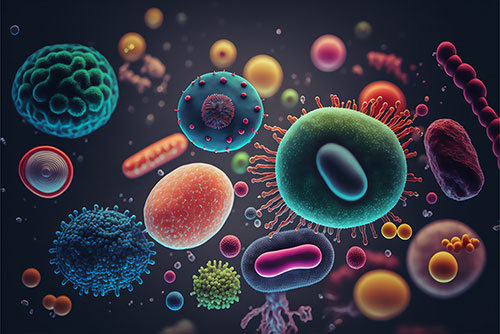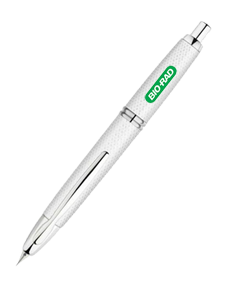
Popular topics

-
References
Chaitman J et al. (2021). Fecal microbial and metabolic profiles in dogs with acute diarrhea receiving either fecal microbiota transplantation or oral metronidazole. Front Vet Sci 7, 192.
Durack J and Lynch S (2019). The gut microbiome: Relationships with disease and opportunities for therapy. J Exp Med 216, 20-40.
Furmanski S and Mor T (2017). First case report of fecal microbiota transplantation in a cat in Israel. Isr J Vet Med 72, 35-41.
Gupta S et al. (2016). Fecal microbiota transplantation: in perspective. Therap Adv Gastroenterol 9, 229-239.
Niina A et al. (2021). Fecal microbiota transplantation as a new treatment for canine inflammatory bowel disease. Biosci Microbiota Food Health 40, 98-104.
Rojas C et al. (2023). Microbiome responses to fecal microbiota transplantation in cats with chronic digestive issues. Preprints.org
Feline Good: FMT Reduces Digestive Problems in Cats

Could the contents of your cat’s litter box be medically valuable? Scientists in California have been investigating the merits of fecal microbiota transplantation (FMT) for cats with chronic digestive problems, and, remarkably, the results were particularly positive. In this blog, we discuss the results and clinical implications of this new study investigating the benefits of FMT in cats.
The Duality of Microbe
We often think of microbes as a bad thing, the bacteria, viruses, and fungi that make us sick. However, trillions of microbes inhabit the gut and have positive impacts on us, including facilitating our digestion, defending us against dangerous pathogens, and maintaining metabolic homeostasis of our guts. This collection of microbes that live in and on the body is known as the microbiome (Rojas et al. 2023, Gupta et al. 2016). The importance of a healthy microbiome is reflected in the observation that persistent changes in its composition can directly affect the health of the host, with implications in chronic gastrointestinal diseases and even cardiovascular, neurological, and respiratory issues (Durack and Lynch, 2019).
One intriguing method of countering problems with the gut microbiota is with fecal microbiota transplantation (FMT), which describes the transfer of fecal matter from a donor with a healthy gut microbiome to a recipient with a poor gut microbiome, to bolster their microbial composition and diversity, and improve health outcomes. Interestingly, FMT has already been shown to have beneficial effects in humans. Recent studies in dogs have shown that FMT is beneficial for treating acute diarrhea and inflammatory bowel disease (IBD) (Chaitman et al. 2020, Niina et al. 2021). Additionally, a case report describing how FMT successfully treated chronic ulcerative colitis in a ten year old female cat has been published (Furmanski and Mor, 2017).
Pawsitive Results
The use of FMT in the treatment of digestive disorders has garnered particular interest lately. However, studies assessing its efficacy in companion animals are limited and have inadequate sample numbers. In this recent study, Rojas et al. investigated the effectiveness of FMT in 68 cats with chronic digestive issues, such as chronic diarrhea, vomiting, constipation, and/or IBD. The cats were given daily oral FMT capsules for around 25 days, and their feces was collected before and two weeks after the treatment period to examine changes in the composition of the microbiome.
The cat’s owners were asked to describe their cat’s response two weeks after FMT treatment, and an impressive 77% reported a reduction in clinical symptoms and an overall improvement in health. These were henceforth known as the “responders,” while the remaining 23% were referred to as the “non-responders.” RNA from the feces was sequenced to compare the microbial diversity of the stool samples. The diversity of the microbiome of FMT recipients correlated with their diet, whether or not they had IBD, and their pre-treatment clinical symptoms.
The microbiome of FMT recipients was also compared to that of the donor animal to examine the ability of donor microbes to colonize the gut. This was achieved by comparing bacterial amplicon sequence variants (ASVs) between the samples. Interestingly, the study found that only around 13% of ASVs were shared between donor and recipients (excluding those already present in recipients before treatment), and the engraftment rate was not associated with responsiveness to treatment. Therefore, complete engraftment of the donor microbiome is not required for successful FMT treatment.
Finally, the scientists found that the microbiomes of cats post-FMT treatment who had exhibited diarrhea symptoms became more similar to healthy age-matched controls than those who experienced other clinical symptoms. Remarkably, cats who had recently received antibiotics had increased similarity to healthy controls post-FMT treatment than those who had not. It was speculated that this was due to the disruption of the gut microbiome by antibiotics, leaving a clear playing field for the engraftment of microbes from FMT treatment.
Is FMT Treatment the Cat’s Pajamas?
While the results look promising, Rojas et al. themselves have pointed out some limitations to the study and advised the reader to proceed with care when interpreting the results. The main weakness that they mention is the use of pet owners’ descriptions to determine clinical improvements in their pets rather than diagnostic tests, which can, of course introduce bias and subjectivity to the findings. Additionally, microbes were not sampled directly from the gastrointestinal (GI) tract; rather fecal samples were used as a proxy, making it difficult to say with certainty the composition of the gut microbiome. Lastly, the fecal microbiome was analyzed two weeks after FMT treatment, so it’s unknown whether the ASVs which engrafted were retained in the recipients for longer than this time period.
Overall, this study suggests that treating chronic digestive problems in cats with FMT capsules could significantly impact overt clinical symptoms, and the response of the fecal microbiome to FMT may be modulated by the recipient’s clinical symptoms, antibiotic use, diet, and IBD diagnosis. Further research will be required to fully optimize this treatment and characterize its effects on the gut microbiome, but maybe one day, FMT will be the purrfect solution to your cat’s GI troubles.
Interested in Understanding More About Feline Diseases?
Bio-Rad has a range of feline antibodies and reagents which facilitate the study of immune responses and disease mechanisms in cats.
References
Chaitman J et al. (2021). Fecal microbial and metabolic profiles in dogs with acute diarrhea receiving either fecal microbiota transplantation or oral metronidazole. Front Vet Sci 7, 192.
Durack J and Lynch S (2019). The gut microbiome: Relationships with disease and opportunities for therapy. J Exp Med 216, 20-40.
Furmanski S and Mor T (2017). First case report of fecal microbiota transplantation in a cat in Israel. Isr J Vet Med 72, 35-41.
Gupta S et al. (2016). Fecal microbiota transplantation: in perspective. Therap Adv Gastroenterol 9, 229-239.
Niina A et al. (2021). Fecal microbiota transplantation as a new treatment for canine inflammatory bowel disease. Biosci Microbiota Food Health 40, 98-104.
Rojas C et al. (2023). Microbiome responses to fecal microbiota transplantation in cats with chronic digestive issues. Preprints.org
You may also be interested in...

View more Veterinary or Article blogs















